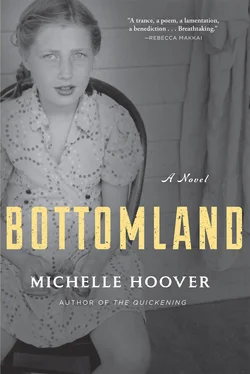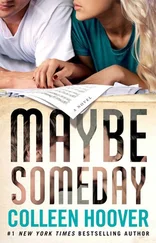“Are you going?” Myrle asked. For a flash, her eyes watered.
“Have to.”
“Remember the paper,” she said. “You promised.”
“A heap of it. Envelopes too.”
Myrle brightened, took our plates, the mess heavy in her arms. The kitchen door swung open. Mrs. Keyes steamed out only to pull up short. “My heavens,” she said. “I about knocked you sideways. Don’t you have any sense?”
Myrle offered up the plates. Mrs. Keyes rested her hands on her hips. “Cleared the plates already,” she said. “You must have some sense after all. Come on in then. You can put them on the counter. Ellen!” she called. The door swung closed behind them. “Watch this new girl with the plates. That’s how it’s done.”
Charlotte had us down the alley in minutes. The first whistle. That’s why she was running, and I was running too, that red of her hair a flag. While the streets churned with people, that red was the only thing that kept her in sight. When at last we stopped enough to slow our chests, we stood at the foot of a large iron door. The building was stone and brick, as great as a ship, and it breathed the way I guessed a ship might, a wheeze from the upper windows that looked small and black and not really windows at all. “This way,” Charlotte said. When she pulled the door open, the building roared. A line of workers with punch cards and lunches, women and men in dusty blue uniforms. Charlotte swept a sweaty hair off her cheek and took me by the hand. Around the corner, a hall longer than anything ever was, and a sign with the word office in gold.
“Now listen,” Charlotte said. This close, even her eyelashes were orange. “When you go in there, you pretend you’ve been doing this for years. Longer even. And you tell them I brought you. Charlotte Byrne. Don’t forget.” She squeezed my hands. Then she was off.
I took a breath. Inside, a large man sat at a desk in a room big enough to store wagons. His lamp glowed through its green glass, the name mr. preston on a block of wood. He bent his face to his papers, a sad circle of hair on his head. When at last he looked up, he grimaced. “Name?”
“Esther.”
“Esther what?”
“Esther. Byrne.”
“Another one,” he said. “Well, Esther Byrne, come out and show yourself. You want a job?”
Come out yourself, mister . But I didn’t say it. I didn’t for once.
The workshop at Kuppenheimer’s was long and narrow as a train car, five floors up, the ceiling almost on our heads. When Preston opened the elevator, I saw waves. A line of girls sat at their machines, fingers flying with scissors and thread. Those machines were close to on top of each another, a hundred or so at once, and the needles whirred. Unless a girl watched herself, any bit of hair or skin might catch. Clouds of cotton kept the air thick. Fuzz of every color stuck to their cheeks. The windows were so dirty the day didn’t show itself, the girls closest to those windows sewing by lamplight like all the rest. Preston led me down the line, but not one of the workers turned her head. The girls were sweating through their collars, the muscles in their necks jumping with Preston at their backs, but their machines never quit.
For me he found a chair at the far end. A large black sewing machine waited on the desk. Preston threw me some scrap and crossed his arms. The man was bigger than me by twice, and those hands of his, they could sure fix fences. “Go on,” he said. “You practice on these, just a hem at a quarter inch. Straight is good but quick is better. If you keep your head about you, we’ll give you a uniform.”
“What about.?”
The girl next to me gasped, but she kept on spinning.
“What about what?” Preston asked.
“Nothing.” I picked up my scraps, and he went off. The girl wiped her nose on her sleeve, her fingers a blur. Her eyelashes flicked at me.
“You don’t know what you’re doing, do you?” she whispered.
“Maybe,” I said. “Maybe not.”
“Do it then.”
I turned to the machine. A dragon, it sure looked, twisted the way it was, and the heat of the wheel every time I hit the pedal. Electric. But this wasn’t light and cups of tea. The place smelled like burning. A single lamp hung over our heads, my face close to the needle so I could see. When I pressed the pedal, that needle pulled fast. The scraps flew, and only my fingers were left. I pushed at the pedal softer then, but still that dragon caught me every other time, just when I was going grand. After an hour or more, my fingers were scraps too. I stuck them in my mouth. The taste of blood. Around me girls worked without even looking, like they’d always been sitting there, cool as dolls, and they were the ones who got the uniform and walked out with their paycheck every week. The room was spinning. I wouldn’t get my papers. Wouldn’t last Chicago more than a day, though I’d promised Myrle something different. Everyone watched me though they pretended they didn’t, sitting as I was with my fingers in my mouth.
The girl next to me sneezed into her sleeve. She sneezed again, worse than a cat. But with every sneeze, her elbow slipped against my desk. It was then I saw it, a new scrap and then another under that elbow of hers, and not so much as a smile on her face. “Thanks,” I whispered and started my pedal again. This time, I pulled against that needle, kept my fingers light. By the end of the shift, I had that wheel going inside my head, but I’d hemmed the rest of the lot he’d given me and some of the girl’s too, straight as I could.
A whistle, loud as knives. The girls stood from their chairs, the place going quiet as the machines stopped. “Byrne!” Preston called out. He took up my scraps. “Pretty good, pretty good. What’s this?” He eyed a bloody one. I hid my hands behind my back.
“Nothing,” I said.
“These are expensive machines, young lady. They aren’t for fingers.”
Phsst , I thought, but I didn’t say it. I knew I’d done better than he might have guessed.
“Practice,” he said. “We’ll give you to the end of the week and see if you’re worth keeping. And here.” He threw me a uniform. Old, with a stain, but it was something. Preston walked off with that heavy gait of his, and I stood from my chair and followed the rest. The girl next to me, she was all elbows and knees, but she grinned. Worth keeping . That’s what the man had said. And there was Charlotte, waiting by the door at the far end with that red of her hair a sign.
“Guess we’re sisters, now?” She winked.
I took her arm, strong and muscle-thin, a smell like smoke in her hair. But it was the whir of those machines I remembered. I never thought I would hear so much. I could feel it in my bones. Electric in my skin. With that uniform over my arm, my chance to become something else.
I started as a shirtwaist maker. Not a cent those first weeks, though at home I’d worked Mother’s pump machine to turn out plenty. “Nothing more than a bicycle,” Preston said to that, but soon he gave me six dollars a week. If I could make a year, he promised seven. But I would never take all of that seven home. If I laughed or spoke, I was fined ten cents. Five cents for a mistake. Five off our checks every week for needles and five for benzine, what they used to clean collars and waists, even if I never soiled a waist once. If I was one minute late, I was fined a cent. If five minutes, I lost half a day’s pay. I got five cents an hour except breaks, thirty-three dimes a week, though those fines made it less. Seven to seven we worked, twelve hours a day. Saturdays the same. Still those dimes were mine. Mine and Myrle’s. It was more than I ever thought we’d get.
Factory girls. That’s what they called us. It wasn’t women with pink dresses and washing machines, but it was something. In any case, the heat from those machines made me think electric could be anything I wanted. And Chicago, it was the only place I knew other than home. Chicago . Even if the name sounded like spitting. Charlotte told me better. “I’ve seen plenty of girls leave the factory for a ring, but I’ve never seen one leave this town. It sticks.”
Читать дальше












